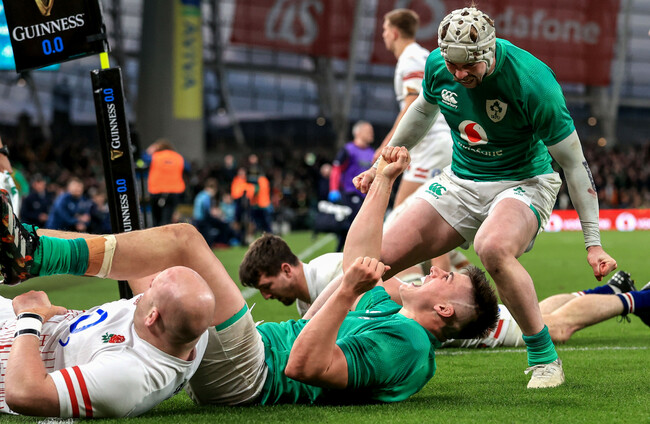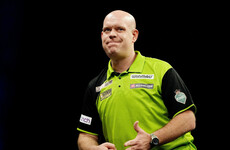GRAND SLAM GAMES are for winning. Just ask the England teams that came to Dublin in 2001, 2011 and 2017. These fixtures come with a specific pressure and only special teams can bear it.
Ireland got the job done today with one of their two worst performances of the championship — but the point is that they got the job done.
It’s only the country’s fourth ever Grand Slam: that’s six fewer than France, eight fewer than Wales and nine fewer than England in the 115 years or so since the introduction of Les Bleus turned the Home Nations Championship into the Five Nations.
Ireland’s Slams in 2009 and 2018, as well as their championship victories in 2014 and 2015, culminated on away soil.
Like most of the rest of us, Andy Farrell and his squad earmarked a potential clincher with England in Dublin as an opportunity to create an Irish rugby occasion the likes of which has never been seen before. And the piece of history at stake at Lansdowne Road today conspicuously weighed on them.
Farrell was visibly drained during his post-match press conference. He didn’t know whether to laugh or cry, he said (he chose the former), and he was mostly relieved that the result was commensurate to the build-up.
“We felt a duty that we couldn’t let people down,” Farrell said, waxing lyrical about the countless fans who had offered their support to Ireland around their team hotel and on the streets of Dublin all week.
If last week’s efforts in Edinburgh had strayed into superhuman territory, today proved Ireland mortal, beatable, but still made of a mighty material.
So much of their success under Farrell has been predicated upon their precision in attack and in their first opportunity for real silverware, one wondered if we had somehow ventured into the alternative reality from Everything Everywhere All At Once in which people have sausages for fingers.
Ireland’s offloading — both in its timing and execution — was almost comically bad by their own standards, as clear a sign of nerves as you’ll see on a rugby pitch. That edginess seeped into the stands, too, from where there were as many groans over 80 minutes as there were guttural roars.
And yet, the long and short of it as that Farrell’s men still scored four tries and managed to finish over the top of an England side which absolutely restored pride in the jersey it had sullied against France last week.
There’s no point in beating around the bush: Freddie Steward’s red card more than helped Ireland’s cause. Notwithstanding the fact that the perceived injustice of it appeared to galvanise England and Steve Borthwick’s side enjoyed one of their best spells in the third quarter when they pulled the deficit back to a single point, it felt inevitable that Ireland would make their numerical advantage count when legs tired in the final act. And they did.
But it would be a stretch to suggest that Steward’s sending-off was the winning and losing of the game. For one thing, Ireland were winning when the fullback turned his body into a prone Hugo Keenan, his opposite number who wouldn’t return for the second half. And for another, they were winning partly because they had defended exceptionally well to that point; England didn’t make a single linebreak in the entire game even with 15 men. They really only had one assault on Ireland’s line in the first half and, other than that, when it mattered, Ireland’s defence marshalled them pretty well towards the edges where the resurgent Manu Tuilagi was less a factor.
Ultimately, even on a day when things went arseways a lot of the time, Ireland produced enough championship moments between them to turn the screw on their opposition.
And it wasn’t just the experienced heads who came up big, either. On 57 minutes, with England trailing 10-9 but edging the second-half arm-wrestle, the visitors won their second scrum penalty. Owen Farrell probed them into the Irish 22′. A couple of phases later, it was Ryan Baird on his 11th cap who won the jackal penalty and punctured the tension that had engulfed the Aviva.
It felt like a massive moment and two minutes later, it proved as much when Johnny Sexton’s crossfield kick from the resulting Irish lineout saw Anthony Watson bundled over his own line. That brought about the five-metre scrum from which Robbie Henshaw crashed over for Ireland’s crucial second try — but it had all stemmed from a brilliant poach by Baird down the other end just as England were flirting with seizing the ascendancy.
Aki, too, who supplied Henshaw with his score, energised Ireland and the stadium with some thunderous carries and defensive hits, as is his wont. The Connacht man is a big-game player for Ireland and shaded his battle with Tuilgai overall.
Obviously, though, no Irish player’s impact on the game was more profound than that of Dan Sheehan, who both steadied the ship and then steered it home.
Sheehan, a doubt earlier in the week with a shoulder injury, made 10 carries for 78 yards, about 20 of which were gained during his opening try as he exploded through a gap created by a beautiful reverse pass by Josh van der Flier. It was like watching a bull running amok through the streets of Pamplona, and he gored Tuilagi who made the mistake of trying to get in his way.
In its own way, the Leinster hooker’s second try was even more impressive in that he possessed the ball three times in the same attacking set; firstly rescuing back some crucial yardage after Ireland’s lineout maul went backwards, secondly bursting down the right after a lovely popped pass by Mack Hansen, and thirdly diving over in the corner after a wonderful tee-up by Jack Conan who had his finest moment in green off the bench.
At just 24, it’s quite frightening to imagine the player Sheehan could yet become when he’s already bending games of this magnitude to his will.
And while Ireland’s performance today won’t have exactly frightened prospective World Cup opponents, the reality that they still have so much room for growth is what separates them from past Irish sides with a World Cup in full view.
“We’re a good side that’s nowhere near reached its potential,” Farrell said matter-of-factly as he addressed the media afterwards.
For now, though, Irish fans can enjoy this team simply for being the fourth in the country’s history to win a Grand Slam.
Whatever happens next, this title will last a lifetime.











Oh Luke Connolly is magic, he wears a magic hat